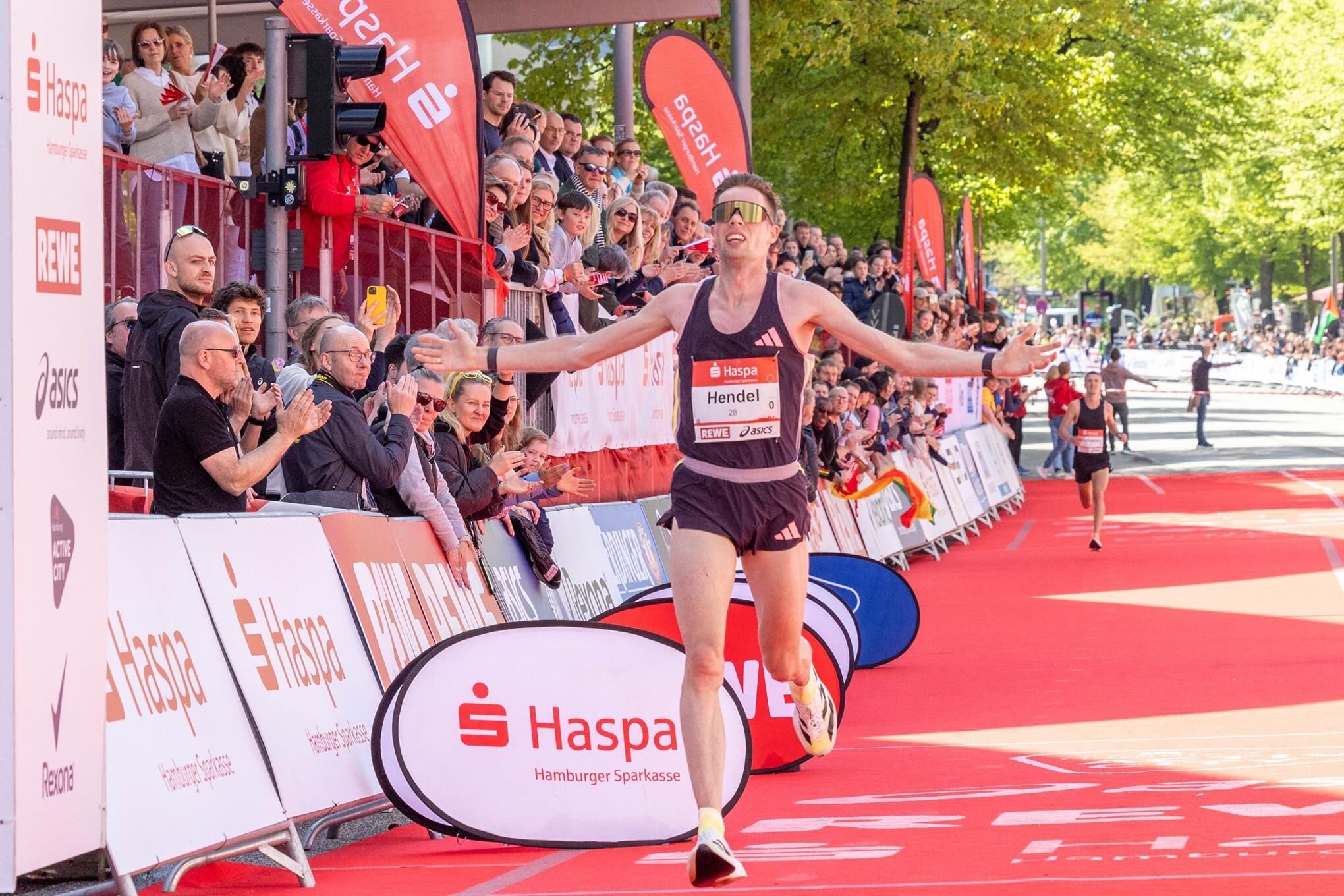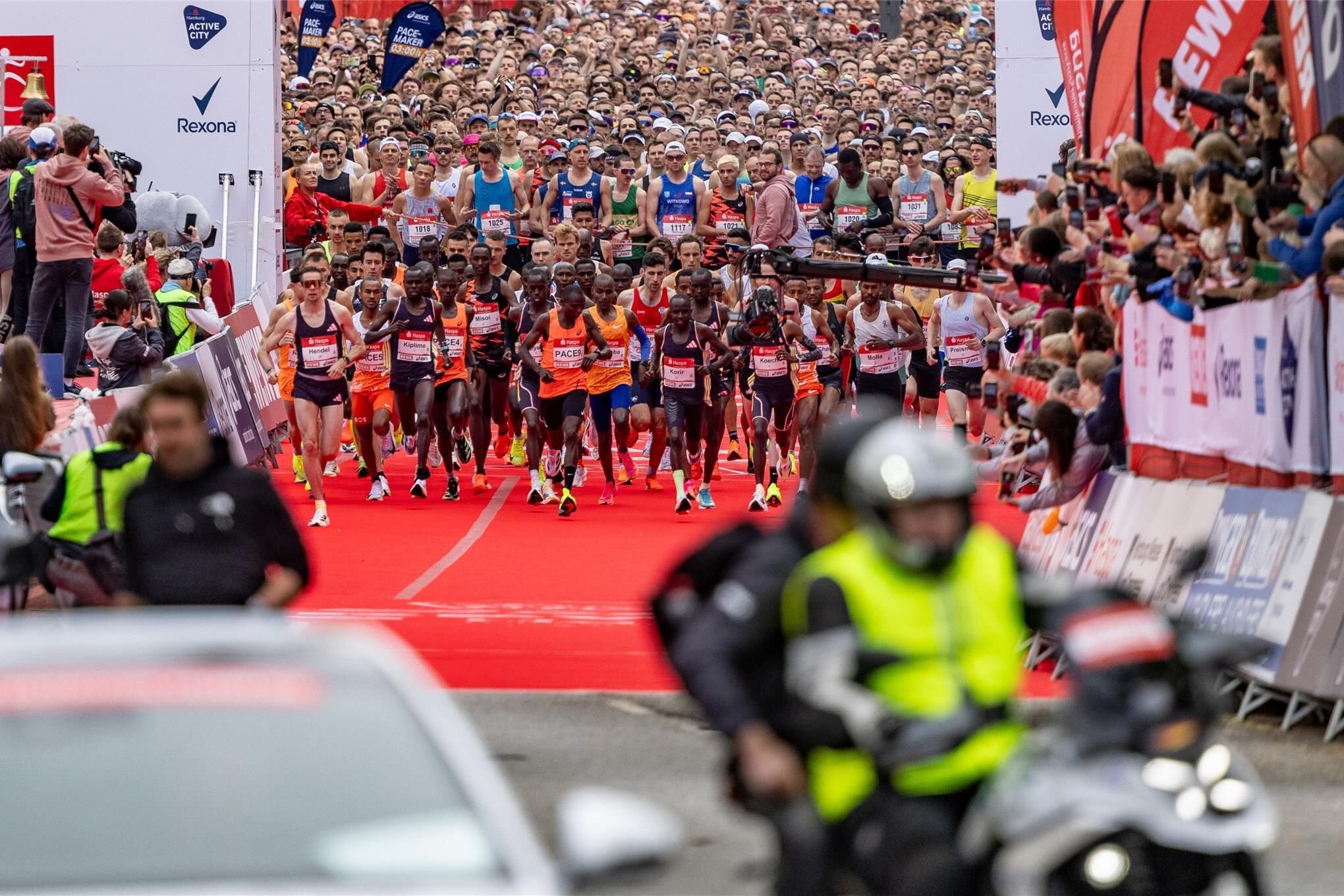Hamburg-Marathon – Get ready to dive into the vibrant world of Hamburg Marathon, a historical and prestigious event that has captivated runners and spectators alike for decades. From its humble beginnings to its current status as a global sporting spectacle, this marathon has witnessed countless stories of triumph, perseverance, and the indomitable spirit of human endurance.
As we embark on this journey through the annals of Hamburg Marathon, we’ll explore its evolution, key milestones, and the impact it has had on the city of Hamburg and the broader running community. Join us as we uncover the secrets behind this iconic race, celebrating the athletes who have graced its course and the legacy it continues to build.
Hamburg-Marathon

Prepare for the ultimate running experience as we delve into the rich history, challenging course, and unforgettable atmosphere of the Hamburg-Marathon. From its humble beginnings to its global recognition, get ready to embark on a journey that will inspire and empower every stride.
Hamburg-Marathon: A Historical Overview
The Hamburg-Marathon, established in 1986, has become a beloved tradition in the Hanseatic city. Over the years, it has witnessed countless triumphs, personal bests, and shared moments of camaraderie. Join us as we trace the evolution of this iconic event, from its inaugural race to its present-day status as a world-class marathon.
Race Details and Logistics
Lace up your running shoes and get ready to conquer the streets of Hamburg! The Hamburg Marathon is an unmissable event for runners of all levels, offering a scenic and challenging course that showcases the city’s iconic landmarks. Mark your calendars and get ready for an unforgettable running experience.
The Hamburg Marathon typically takes place in late April or early May, attracting thousands of participants from around the world. The race offers a full marathon distance of 42.195 kilometers, as well as a half-marathon option for those looking for a shorter challenge. The course winds through the heart of Hamburg, passing by famous sights such as the Elbphilharmonie, Speicherstadt, and Reeperbahn.
Registration and Eligibility
Registration for the Hamburg Marathon typically opens in the fall of the preceding year. Runners can register online through the official race website. Eligibility criteria include being at least 18 years of age on race day and having adequate training and fitness to complete the distance. Entry fees vary depending on the race category and registration period, so be sure to check the official website for the most up-to-date information.
Race Course and Elevation Profile
The Hamburg Marathon course is renowned for its scenic beauty and challenging elevation profile. The race starts and finishes at the Heiligengeistfeld, a large open space near the Elbe River. The course then takes runners through the historic Speicherstadt warehouse district, past the iconic Elbphilharmonie concert hall, and along the bustling Reeperbahn entertainment district. The course is relatively flat, with a few gradual inclines and declines throughout the route.
Logistics and Spectator Areas
Getting to and from the Hamburg Marathon is easy, with excellent public transportation options available. The race organizers also provide shuttle buses to transport runners to the start line from designated pick-up points. Parking is limited on race day, so participants are encouraged to use public transportation or carpool if possible. Spectator areas are located along the entire course, allowing friends and family to cheer on their runners at various points throughout the race.
Training and Preparation
The Hamburg Marathon is a challenging but rewarding experience. With the right training and preparation, you can cross the finish line feeling strong and accomplished.
Here are some tips to help you get ready for the big day:
Training Plans
There are many different training plans available, so it’s important to find one that fits your fitness level and goals. If you’re a beginner, start with a plan that gradually increases your mileage and intensity. If you’re more experienced, you may want to try a plan that includes interval training or hill workouts.
Nutrition and Hydration
Eating a healthy diet is essential for runners of all levels. Make sure to eat plenty of fruits, vegetables, and whole grains. You should also drink plenty of fluids, especially water.
Injury Prevention
Running can be hard on your body, so it’s important to take steps to prevent injuries. Warm up before each run and cool down afterwards. Listen to your body and take breaks when you need them. If you do experience pain, stop running and see a doctor.
Race-Day Strategies
On race day, it’s important to have a plan. Know what pace you want to run and stick to it. Don’t start out too fast or you’ll burn out. Take advantage of the aid stations to stay hydrated and fueled. And most importantly, don’t give up!
Mental Preparation
Running a marathon is a mental as well as a physical challenge. It’s important to stay positive and motivated throughout your training and on race day. Visualize yourself crossing the finish line and focus on the feeling of accomplishment you’ll have.
Elite Athletes and Past Winners

The Hamburg-Marathon has consistently attracted a field of elite athletes, both domestic and international, who have pushed the boundaries of human endurance and left an indelible mark on the event’s history.
Over the years, numerous renowned runners have graced the streets of Hamburg, showcasing their exceptional talent and determination. These elite athletes have not only set impressive personal bests but have also contributed to the event’s prestige and popularity.
Notable Elite Athletes
- Eliud Kipchoge (Kenya): The current world record holder in the marathon, Kipchoge has won the Hamburg-Marathon three times (2013, 2015, 2017) and holds the course record of 2:04:00 set in 2013.
- Mo Farah (Great Britain): A multiple Olympic and World Champion, Farah made his marathon debut in Hamburg in 2018, finishing in third place with a time of 2:08:31.
- Kenenisa Bekele (Ethiopia): The former world record holder in the 5000m and 10000m, Bekele won the Hamburg-Marathon in 2016 with a time of 2:06:47.
- Haile Gebrselassie (Ethiopia): Widely regarded as one of the greatest distance runners of all time, Gebrselassie won the Hamburg-Marathon in 2007 with a time of 2:09:30.
- Irina Mikitenko (Germany): A three-time Olympian and former world champion, Mikitenko has won the Hamburg-Marathon a record five times (1999, 2001, 2002, 2004, 2005).
Past Winners
| Year | Winner | Nationality | Winning Time |
|---|---|---|---|
| 2022 | Abel Kipchumba | Kenya | 2:04:17 |
| 2021 | Felix Kipkoech | Kenya | 2:04:51 |
| 2020 | Cancelled due to COVID-19 | N/A | N/A |
| 2019 | Bethwel Yegon | Kenya | 2:06:14 |
| 2018 | Tesfaye Abera | Ethiopia | 2:07:54 |
| 2017 | Eliud Kipchoge | Kenya | 2:05:30 |
| 2016 | Kenenisa Bekele | Ethiopia | 2:06:47 |
| 2015 | Eliud Kipchoge | Kenya | 2:05:30 |
| 2014 | Lucas Rotich | Kenya | 2:07:19 |
| 2013 | Eliud Kipchoge | Kenya | 2:04:00 |
Memorable Moments
The Hamburg-Marathon has witnessed several unforgettable performances over the years. In 2013, Eliud Kipchoge shattered the course record with a time of 2:04:00, becoming the first person to run a sub-2:05 marathon in Germany.
In 2016, Kenenisa Bekele made a remarkable comeback after a long injury layoff, winning the Hamburg-Marathon in a time of 2:06:47. This performance marked Bekele’s return to top-level competition and reignited his hopes of breaking the world record.
The Hamburg-Marathon has also seen its fair share of drama and heartbreak. In 2019, Kenyan runner Bedan Karoki collapsed just meters from the finish line, but managed to stumble across in a time of 2:08:29, securing the victory.
Charity and Community Involvement
The Hamburg-Marathon is not just a sporting event; it’s also a platform for charitable giving and community engagement. Over the years, the marathon has raised millions of euros for various charities and local organizations, making a significant impact on the lives of many.
Specific Charities and Organizations
Numerous charities and organizations have benefited from the Hamburg-Marathon’s fundraising efforts, including:
– Hamburger Tafel e.V., a food bank that provides food to those in need
– Kinderhospiz Sternenbrücke, a children’s hospice that provides care and support to terminally ill children and their families
– DKMS, a non-profit organization that fights against blood cancer
Fundraising Successes
The Hamburg-Marathon has consistently surpassed its fundraising goals, with the 2022 edition raising over €2 million for charity. This money has been used to fund a wide range of projects, such as:
– Providing food and shelter to the homeless
– Supporting medical research and treatment programs
– Offering scholarships to underprivileged students
Innovative Fundraising Strategies
Participants and organizers of the Hamburg-Marathon have employed innovative fundraising strategies to maximize their impact. These include:
– Charity running teams: Groups of runners raise funds for specific charities by collecting donations from friends, family, and colleagues.
– Online fundraising platforms: Participants can create personalized fundraising pages to share with their networks and track their progress.
– Special events: The marathon organizers host various events throughout the year, such as charity dinners and auctions, to raise additional funds.
Community Spirit and Camaraderie
The Hamburg-Marathon fosters a strong sense of community spirit and camaraderie among participants and volunteers. The shared experience of running together creates bonds that extend beyond the finish line. The event brings people from all walks of life together, promoting a sense of belonging and unity.
Cultural Significance and Impact
The Hamburg-Marathon is more than just a sporting event; it has become an integral part of the city’s cultural fabric. It brings together people from all walks of life, creating a sense of community and pride.
The race has a significant impact on the city’s economy, with an estimated 100 million euros generated annually. It also attracts thousands of tourists, who come to experience the race and the city’s vibrant atmosphere.
Symbol of Sporting Spirit
The Hamburg-Marathon has become a symbol of the city’s sporting spirit. It is a testament to the city’s commitment to fitness and healthy living. The race has also inspired many local residents to take up running, promoting a healthier lifestyle.
The Hamburg-Marathon is a true celebration of the city’s sporting heritage. It is an event that brings people together, showcases the city’s beauty, and inspires a love of running.
Economic Impact and Tourism

The Hamburg-Marathon has a significant economic impact on the city of Hamburg, generating millions of euros in direct and indirect spending. The event attracts thousands of visitors from around the world, contributing to hotel occupancy rates and spending on food, beverage, retail, and transportation.
Tourism
The Hamburg-Marathon plays a crucial role in promoting the city as a tourist destination. The event attracts visitors from over 100 countries, generating an estimated €15 million in tourism revenue. Visitors often extend their stay to explore the city’s unique attractions, such as the Speicherstadt, the Elbphilharmonie, and the Miniatur Wunderland.
Economic Impact
The Hamburg-Marathon also creates jobs and generates tax revenue for the city. The event employs over 1,000 people, including race organizers, volunteers, and security personnel. The direct spending on the event, including registration fees, sponsorship, and vendor expenses, is estimated at over €10 million. Indirect spending, such as visitor spending on hotels, restaurants, and transportation, is estimated at an additional €25 million.
Long-Term Benefits
The Hamburg-Marathon has long-term economic benefits for the city, including increased investment in infrastructure, urban renewal, and community development. The event has helped to revitalize the city center and has contributed to the development of new tourist attractions. The marathon has also raised millions of euros for local charities, supporting a wide range of community initiatives.
Recommendations
To maximize the economic impact and tourism potential of the Hamburg-Marathon, the following recommendations are suggested:
* Develop strategies to attract more visitors from international markets.
* Promote the city’s unique attractions and cultural offerings to marathon participants and their families.
* Enhance the overall experience for visitors by providing excellent customer service and creating a welcoming atmosphere.
* Invest in infrastructure improvements to support the growth of the event and tourism in the city.
Environmental Sustainability

The Hamburg-Marathon organizers are committed to minimizing the environmental impact of the event. They have implemented various sustainable practices, including waste reduction initiatives, energy conservation measures, and responsible water usage.
Waste Reduction Initiatives
The organizers have introduced several waste reduction initiatives to minimize the amount of waste generated during the marathon. These include:
- Composting organic waste, such as food scraps and paper products
- Recycling materials, such as plastic, glass, and metal
- Providing reusable water bottles to runners and spectators
Energy Conservation Measures
The organizers have also implemented energy conservation measures to reduce the marathon’s carbon footprint. These include:
- Using LED lighting for the course and event venues
- Installing solar panels to generate renewable energy
- Using energy-efficient equipment and appliances
Responsible Water Usage
The organizers have implemented responsible water usage practices to minimize the marathon’s water consumption. These include:
- Installing water stations with filtration systems to reduce the use of bottled water
- Encouraging runners and spectators to bring their own reusable water bottles
- Reducing water consumption in event operations
Challenges and Opportunities
While the Hamburg-Marathon organizers have made significant progress in reducing the event’s environmental impact, there are still challenges and opportunities for improvement. Potential areas for improvement include:
- Further reducing waste generation by implementing more comprehensive recycling and composting programs
- Increasing the use of renewable energy sources to power the event
- Exploring innovative water conservation technologies and practices
The organizers are committed to working with stakeholders to identify and implement best practices from other marathons and sporting events to enhance the environmental sustainability of the Hamburg-Marathon.
Quote from Hamburg-Marathon Organizers
“We are proud of the progress we have made in reducing the environmental impact of the Hamburg-Marathon. However, we recognize that there is always more that can be done. We are committed to working with our partners to make the Hamburg-Marathon a model of sustainability for other sporting events.”
Summary of Key Findings and Recommendations
The Hamburg-Marathon organizers have implemented various sustainable practices to minimize the environmental impact of the event. These practices include waste reduction initiatives, energy conservation measures, and responsible water usage. While there are still challenges and opportunities for improvement, the organizers are committed to enhancing the environmental sustainability of the Hamburg-Marathon.
Technology and Innovation
The Hamburg-Marathon embraces technology to enhance the experience for runners and spectators alike. GPS tracking devices monitor runners’ progress, providing real-time updates for safety and peace of mind. Race management systems streamline operations, ensuring smooth event execution. Mobile applications empower spectators with live race updates, results, and interactive features.
Personalized Training and Immersive Experiences
Technology has opened doors to personalized training plans tailored to individual needs through AI-powered platforms. Virtual reality race experiences allow runners to train and race in immersive environments, while augmented reality overlays provide interactive race information and overlays. These advancements enhance training effectiveness and create a more engaging experience for participants.
Social Media and Online Presence
The Hamburg-Marathon maintains a robust online presence across various social media platforms, effectively engaging with runners and the public. The marathon’s social media strategy revolves around fostering a sense of community, promoting the event, and providing valuable information to participants.
Building an Online Community
The Hamburg-Marathon leverages social media to cultivate an active online community of runners and enthusiasts. Through regular posts, live updates, and interactive Q&A sessions, the marathon’s social media team engages with followers, fostering a sense of belonging and excitement around the event.
Media Coverage and Public Relations: Hamburg-Marathon

The Hamburg-Marathon enjoys extensive media coverage, boosting its visibility and popularity. The organizers employ strategic public relations tactics to cultivate positive publicity and foster media partnerships.
Media Relations Strategies
* Press Releases: Regular press releases provide updates on event preparations, elite athlete participation, and community involvement.
* Media Briefings: Press briefings offer journalists exclusive access to event organizers and key stakeholders for in-depth discussions.
* Media Kit: A comprehensive media kit containing essential facts, statistics, and contact information aids journalists in their coverage.
* Social Media Engagement: The marathon’s social media presence engages journalists and promotes the event, fostering a two-way communication channel.
* Media Reception: Hosting a media reception or press conference strengthens relationships with journalists and generates coverage opportunities.
Media Coverage Enhancement
* Key Media Outlets and Journalists: Identifying and targeting influential media outlets and journalists ensures targeted coverage.
* Media Relations Plan: A structured plan Artikels press release schedules, media briefings, and other outreach activities.
* Media Coverage Tracking: Monitoring media coverage helps assess its impact on the event’s visibility and reputation.
* Negative Publicity Response: A timely and professional response to any negative publicity mitigates its impact.
Partnerships and Collaborations
* Local and National Sports Organizations: Partnerships with these organizations expand media exposure and credibility.
Future Trends and Outlook

The Hamburg-Marathon is constantly evolving to meet the changing needs of runners and the industry. Here are some potential trends and innovations that could shape the future of the event:
The increasing popularity of virtual and hybrid races could lead to the Hamburg-Marathon offering more flexible options for runners who are unable to travel to Hamburg or who prefer to run on their own schedule. The event could also explore the use of augmented reality and other technologies to enhance the race experience for virtual runners.
Sustainability, Hamburg-Marathon
The Hamburg-Marathon is committed to sustainability, and the event is likely to continue to adopt new practices to reduce its environmental impact. This could include using more sustainable materials for race materials, partnering with local organizations to offset the event’s carbon footprint, and encouraging runners to use public transportation or carpool to the event.
Technology
Technology will continue to play a major role in the Hamburg-Marathon. The event could explore the use of new technologies to improve the race experience for runners, such as real-time tracking, personalized race plans, and interactive maps. The event could also use technology to enhance the spectator experience, such as live streaming and interactive displays.
Community Involvement
The Hamburg-Marathon is deeply rooted in the Hamburg community, and the event is likely to continue to find ways to engage with the community. This could include partnering with local schools and charities, hosting community runs and fitness events, and volunteering opportunities.
Elite Athletes
The Hamburg-Marathon is one of the world’s leading marathons, and the event is likely to continue to attract top elite athletes. The event could explore new ways to support elite athletes, such as providing them with training and recovery facilities, and offering prize money and other incentives.
End of Discussion

Hamburg Marathon stands as a testament to the power of human determination and the pursuit of excellence. Its legacy extends far beyond the finish line, inspiring countless individuals to push their limits and embrace the transformative spirit of running. As we look towards the future, we can be certain that Hamburg Marathon will continue to captivate and inspire generations to come, leaving an enduring mark on the world of sports and the hearts of those who experience it.
Frequently Asked Questions
When is the Hamburg Marathon held?
The Hamburg Marathon is typically held in April.
What is the distance of the Hamburg Marathon?
The Hamburg Marathon is a 42.195-kilometer (26.219-mile) race.
How can I register for the Hamburg Marathon?
Registration for the Hamburg Marathon typically opens in the fall. You can register online or by mail.